
You might have seen this thing on TV called the Eurovision Song Contest, where the countries of Europe come together to see who’s got the best song that year. It’s held each May in different cities across Europe, depending on which country won the contest the year before. There are two semi-finals, and one Grand Final. The countries who choose to compete send in an entry, and then the European public vote by phone to decide the winner, along with a musical jury who have half the vote.
Eurovision began in 1956, a time when the Cold War was really hotting up. It was held in Switzerland, a place that’s always been very neutral politically, so a good choice to hold this highly political song contest. The UK started to compete the next year, in 1957, with the song “All” – finishing 7th. Then, 20 years later, the Soviet Union (so that’s Russia and its surrounding countries, like Belarus, Ukraine and Romania) set up the “Intervision” song contest. This was set up to rival Eurovision, because people in the USSR were getting around the ban on Western TV in order to tune into Eurovision! This increased the divide between East and West, as it polarised and set Eastern and Western European countries against each other. This reflected the political situation, in some ways. On a lighter note, one of the entries on Intervision’s predecessor was the internet meme “The Trolololol song”, and its recent popularity might help heal these divides between young people.
Eurovision has this group of countries called the “Big Four”, who don’t have to compete in the semi-finals in order to get into the Grand Final. These countries are the UK, France, Germany and Spain, because they pay the most to the show’s organisers. Every other country who competes has to get through 1 semi-final. In 2010, Italy was added, so now it’s the “Big 5”! However this decision wasn’t popular with everyone, and Turkey actually pulled out of the 2013 contest because they objected to these countries automatically getting through.
One big criticism the contest has faced from us, the British public, is that the countries of the “Eastern Bloc” always win because they vote for each other. This is since the end of the Cold War, as the ex-Soviet countries joined up to Eurovision. So, in order to combat this, the Eurovision organisers had to bring back the juries to stop the ‘favouritism’ between Eastern European countries many believed to be the case. However, the UK still hasn’t done any better!
Last year’s winning entry came from Austria, with transvestite Conchita Wurst singing “Rise like a Phoenix”. Many people saw this as a victory for gay rights, so as you can see, Eurovision has a political role as well. Other famous entries include Bucks Fizz, a UK winning entry in the 1980’s, that featured the two male band members ripping the skirts off the female band members, which definitely wouldn’t get the same reaction today! More political entries include Lasha Tumbai, a Ukrainian entry in 2007 by a cross-dressing comedian, which caused a lot of arguments. “Lasha Tumbai” apparently sounded like “Russia Goodbye”, revealing Ukraine’s upset with its ex-occupier.
So, next May, have a bit of fun by getting your friends round for a bit of a Eurovision party!
Image from: http://www.eurocircle.com/events/29775

0 Comment:
Be the first one to comment on this article.